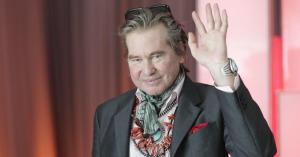After a string of increasingly punishing watches, Fargo looks headed on a rising tide of black momentum.
FX’s latest offering in the defining crime series (“The Law of Inevitability“) shifts Minnesota’s centers to a new collision course just in time for their Christmas holiday via delicately balancing pieces and the hour’s surprise bus flip conclusion.
Videos by PopCulture.com
Diehard fans’ patience has also been rewarded by the chapter’s genuinely shocking “reveal”: The rabidly watched series’ now-longest-running singular walker, Mr. Wrench, returning in the flesh.
A hitman previously seen on assignment for the Fargo, North Dakota mob, Mr. Wrench fluently exchanges truth and lies alike in American Sign Language — an articulation method perpetually underestimated by outsiders.
Like speakers of any other language, ASL signers easily use it around non-interpreters to exchange meaning covertly, whether for business or amusement or some combination of the two (unforgettably witnessed in Wrench’s debut appearances).
The method should make him a supremely challenging foil (or possible ally) for Nikki Swango with her card-based communication style, and the aftermath of the “accident” may only be the start of a titanic conclusion to either’s tale.
An enigmatic criminal hero unlike any in the Upper Midwest, Mr. Wrench (Russell Harvard, returning to the role) has endless plausible reasons for occupying his seat on the bus, even if its pre-arrangement seems certain. Fargo mappers will still furiously speculate how he was seated there alone, nearly five years since the 2006-set debut FX edition.
In previous iterations on FX, individual Fargo titles — the sole non-audiovisual cues allowed a place in the series’ “true stories” — sprang from writers and thinkers that questioned the nature of possibility.
The first year’s seventh hour, as a well-known example, asks “Who Shaves the Barber?” over a hundred years after Bertrand Russell stumped mathematicians of his day with the same question, and its follow-up “The Heap” stems from one of language’s slipperiest endless paradoxes.
The second installment’s famous next-to-last hour “The Castle” is titled for one of the few great (known) unfinished novels, itself an illustration of an endless struggle, after a season of discussion inspired by such philosophy. The perceived impossibility of resting at the highest summits also runs through the latest chapter via the Stussys’ coveted stamp of Sisyphus.
Nikki Swango may still prove thankful for escaping St. Cloud Police’s hands (and whomever else’s her should-be protectors manage to allow access), but her entanglement with crime “organized” by a hostile party bridged from possible to inevitable as soon as she blackmailed a could’ve-been brother-in-law with the backing of V.M. Varga’s “Narwhal” alliance.
Yuri Gurka’s wolf concealment distracts Nikki’s bus driver but now announces him unmistakably for the audience. After his earlier library distraction play — made simple as can be by Donny’s date-swiping failure daze — the collected purveyors of untruth have Ennis Stussy’s investigation file to go along with their new captive.
If Emmit’s future was hanging precociously when he placed his call to V.M., it’s in sinking waters after his “projections”-set dinner with Sy and Ruby was joined by an unexpected fourth in Officer Winnie Lopez.
Emmit veers off track immediately after arriving while, unbeknownst to him, V.M. opens his “family’s” Christmas gifts early — such a nice tie! — and prepares him for who knows what next escalation when the holiday morning arrives.
Emmit doomed himself when he sat down in the Bear’s Den without re-adjusting to a surrounding that hadn’t changed since his earlier slaughter, although Sy instinctively offered a hopeful alibi and did his best to shepherd him from the disaster quickly.
Winnie arriving to find Emmit immediately giving himself away further means the Law can begin digging to see what may be found. Storage Queen Ruby Goldfarb’s apparent choice is to either hand them a shovel or stand in the way.
Gloria’s inevitable battle, like Fargo police Molly Solverson before her, is to try to collect the pieces of the bizarrely connected killings with documentation — paper — but St. Cloud’s bureaucracy of non-thinking makes it a logistical non-starter.
Dammick, who not only made sure to arrest Nikki himself but also interrogate her solo, has had a constant hand in suppressing Gloria’s requests for information since taking over Eden Valley Police before she even returned from her Los Angeles self-assignment.
The volume of different colored forms are, in clear terms, a mere symbol of how many hoops there are to counter her hope of a productive investigation under St. Cloud authority. Each room in the building seems designed to keep her from asking a single question without an officer (of some kind) behind her back.
The momentary exception, which may hopefully yet deliver despite Nikki’s perilous ending, is her offer for a meaningful dessert with Nikki Swango — whose taste in pie would live up to Gloria’s high expectations.
The moment even has to come after a mysterious intruder, or possible St. Cloud Police associate, arrives to presumably silence her before any extra party has a chance to sit across the table.
With just three hours left, the stakes have been re-raised for a three-hour climax as tense as the 1979-set story’s conclusion. Fans’ allegiances will be tested again, with deserved favorites Nikki Swango and Gloria Burgle both finding themselves up against a force that’s yet to be seen.
- DJ Qualls, memorably of Breaking Bad‘s “Better Call Saul,” guest stars as the apparent intruder with a loaded syringe and surprise roundhouse kick to the St. Cloud station. The would-be assassin is named simply “Golem.”
- Emmit invokes famed economist Adam Smith, saying “All for ourselves and nothing for other people is the vile maxim of the masters of mankind.” The phrase is taken from Smith’s The Wealth of Nations.









